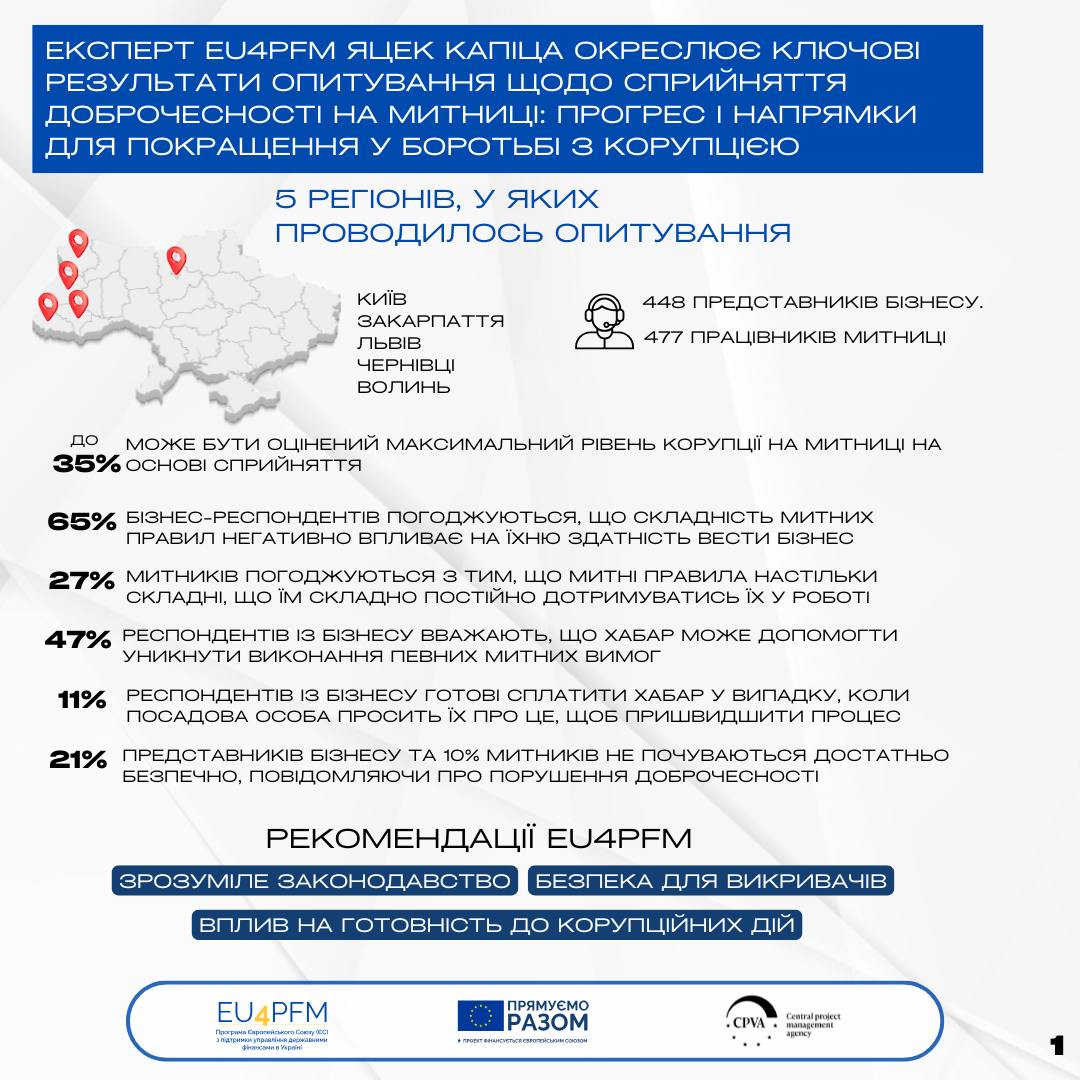EU4PFM Expert Jacek Kapica highlights key findings from the Customs Integrity Perception Survey: progress and areas for improvement in combating corruption
The maximum level of corruption at customs, based on perception, can be estimated at up to 35%. Additionally, 65% of business respondents agree that the complexity of customs regulations negatively impacts their ability to conduct business, and 47% believe that a bribe can help avoid certain customs requirements.
These findings come from the Customs Integrity Perception Survey (CIPS), conducted by the State Customs Service in cooperation with the World Customs Organization’s (WCO) Anti-Corruption and Integrity Promotion (A-CIP) Programme. An EU4PFM International Expert in anti-corruption activities Jacek Kapica draws attention to these results and provides recommendations based on the survey findings, which involved customs officers and business representatives, offering support to the SCS for their implementation.
The Expert highlights responses that may, despite their seemingly low percentages, indicate deeper-rooted aspects of the problem, contributing to the overall perception of corruption. In identifying the issue, solutions are also proposed.
The Expert outlines three main areas of concern: the level of corruption and “readiness” for it, safety and the “internal climate,” and the complexity of legislation.
Level of Corruption: There is a notable level of confirmation that it is a solution not to comply with customs requirements through the payment of bribes, with 35% confirming that this is often or always possible. This means that the maximum level of corruption based on perception can be estimated at 35%, and this figure correlates with data from other surveys, including the study “Corruption in Ukraine 2023: Understanding, Perception, Prevalence,” commissioned by EUACI and NACP (where 35.2% of respondents confirmed having personally encountered or known of employees who faced corruption at the State Customs Service).
On the other hand, this also confirms a willingness among customs officers to accept bribes in exchange for avoiding legal requirements.
At the same time, 11% of business respondents are willing to pay a bribe if asked by an official to speed up the process.
• Recommended Actions: A public campaign could be launched, for example: “Don’t offer, we don’t accept, and it will cause you problems.” Such a campaign could demonstrate that customs is ready for change and internal actions to increase customs integrity by building resistance to corruption
Safety and the Internal Climate: 10% of customs officers and 21% of business representatives do not feel safe reporting integrity violations.
For businesses, this could be due to concerns about the continued safety of their operations after reporting. Besides hesitation in reporting corruption, business representatives in 16% disagree that the customs administration’s leadership takes action against corruption, and 10% feel that it does not set a positive example regarding integrity.
The level of encouragement to report violations correlates with two other important elements. For instance, 12% of customs officers disagree with the statement that their supervisors encourage them to report integrity violations, and 10% believe that reporting corrupt behaviour leads to actions against such behaviour.
A signal worth noting is how customs officers would react if they suspected a colleague of taking money from businesses to ignore procedures. While 80% would report this to their supervisor, 83% would not report it to the internal investigation unit. This suggests that the supervisor has strong authority, and the customs officer has very limited willingness to report outside the team . The specifics of the manager’s authority and management style may also be indicated by the fact that in a situation where the manager asks to deviate from standard procedures, 46% of customs officers do not feel sufficiently informed about why this is necessary. Furthermore, 14% of officials confirmed that they sometimes face interference from other officials when applying standard procedures, and 7% report never being able to act without interference.
• Recommended Actions: Develop safety measures for those who choose to report corruption, ensure transparency, and provide examples of the outcomes of reports without disclosing the identity of the reporter. Conduct training for all customs officers, including a presentation of the internal unit contact person for reporting on corruption security.
Complexity of Legislation: Legislation appears complex to both groups of respondents. 27% of customs officers agree that customs rules are so complicated that it is difficult to consistently follow them in their work. Furthermore, 65% of business respondents believe that the complexity of customs rules negatively affects their business. In fact, 11% of business respondents do not follow these rules or are often willing to avoid doing so.
Another aspect of legislative complexity is that 13% of business respondents do not always understand the decision made by customs regarding their case and find it difficult to obtain information about why the decision was made.
• Recommended Actions: Implement EU-compatible norms, enhance the information system with explanations of regulatory interpretations, instructions, interpretations, and offer training/webinars for businesses and a support hotline.
The survey was conducted in September 2024 in five regions of Ukraine and covered 448 customs officers and 477 business representatives. The margin of error is 4%.
Original source: https://www.wcoomd.org/en/media/newsroom/2024/december/ukraine-takes-its-first-look-at-results-from-the-cips-under-the-wco-acip-programme.aspx
